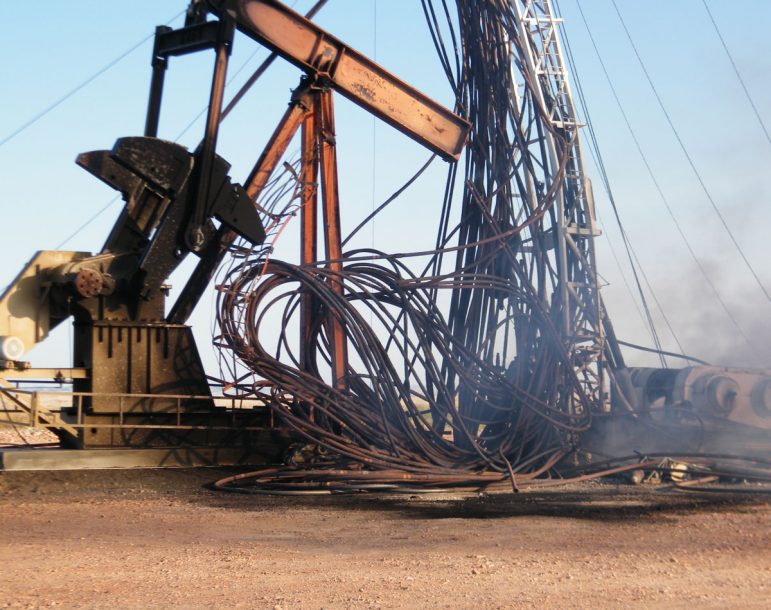Working on an oil field, or an oil rig is one of the most dangerous jobs in America today. According to the Occupational Safety and Health Administration (OSHA), some of the most common causes of serious injuries in the oil industry include:
-Transportation accidents
-Fires and explosions
-Accidents with objects and equipment
Explosions on platforms can have devastating consequences to oil workers, to adjacent properties due to fire damage, and of course to the operation itself. Normally, there are various liability issues in the event of an explosion or fire occurring in an oil well, since there are usually many people involved in the operation of the oil well. It is crucial to identify the people responsible.
Explosions and fires occur in platforms and areas of oil wells for several reasons, such as faulty machinery and equipment that fails and causes a devastating chain of events. Negligence on the part of any worker can also play a crucial role in the accident. However, usually, the fault lies with the company in charge of the platform, which on many occasions “takes shortcuts” to prevent production from being delayed.
These accidents can result in serious injuries. There are hundreds of workers who are killed in oil fields every year throughout the United States according to OSHA. When the injuries are not fatal, they can be very severe, leaving a worker with permanent scars, disfigurement, and disability. These injuries include, but are not limited to:
-Drowning
-Hypothermia
-Carbon monoxide poisoning
-Cuts and lacerations
-Amputations
-Fractures and broken bones
-Spinal cord injuries
-Paralysis
-Death
-Severe burn injuries, including second- and third-degree burns.
-Hearing loss (exposure to loud noise such as that produced during an explosion).
-Blindness or other eye injuries.
-Traumatic brain injuries.
Occupational diseases, which may result from exposure to toxins or chemicals in the workspace, among other things.
Common Causes of Accidents in Oil Fields
These accidents can occur as a result of falls from an unsafe platforms (which may be the result of defective equipment), lack of safe equipment and tools, fatigued workers (employees regularly work long days, covering 12 or 14 hours), lack of operator attention when driving a machine or tool or motorized vehicle, lack of signaling, lack of training, and other acts of negligence.
Unfortunately, accidents that occur in oil fields are the result of negligence. For example, a transportation incident can be avoided by paying more attention while driving. An accident with machinery can be avoided with proper maintenance or better training for workers. Sometimes slowing down and prioritizing safety can save a life or prevent a serious injury.
Life after an injury in an oil field
Those who have a job in the oil industry regularly do so because they see it as an opportunity to earn money and have a better chance of life despite the risks. However, for those who are injured working in the oil industry, life is not usually the same after. A worker who suffers a serious injury in an oil field or oil rig has to live with the pain of the injury and any disability that may result.
They can also face huge medical expenses and be overwhelmed by the loss of their wages. An injured oil worker may have to invest in in-home health care or make living adjustments, such as a wheelchair and a wheelchair-friendly house or vehicle.
They may be unable to get a job in the future, particularly one that pays them a living wage and allows them to support their family. Of course, the worker can also have psychological injuries, which not only hurts him personally but also his loved ones.
Workers’ compensation vs. a personal injury claim
To hold the oil company responsible for the injuries suffered in an oil field, the injured party has to prove that the employer was negligent. Therefore, a plaintiff must demonstrate that the oil company deviated from the standard of reasonable care owed to its employees. Three essential elements must be proven to succeed in a theory of negligence. These elements are:
-The oil company had a legal duty of care towards its employee (s);
-The oil company failed to comply with said duty;
-As a result of this failure or breach, the plaintiff suffered damages.
If you have been injured in an oil field in Texas and have suffered some of the losses listed above, or if you are the survivor of a worker who was killed while working in an oil plant, you need a legal defender by your side that can help you understand the process of filing a claim and recovering compensation for your losses. Normally there are two ways to recover:
Workers compensation insurance
If you work for an oil company, your employer is likely required to have workers’ compensation insurance. Workers’ compensation insurance provides workers with compensation for their reasonable and necessary medical expenses, a percentage of their lost wages and their disability (as well as death benefits for family members) when an employee is injured while performing a work-related task.
The problem with workers’ compensation insurance is that although it is a no-fault system, it does not allow workers to file a personal injury claim directly against their employer, nor to seek compensation for non-economic losses, such as for the value of their pain and suffering.
Claims of civil liability of a third party.
The other option to recover compensation after an injury in an oil field is to file a civil liability claim directly against the oil company. You cannot file a claim directly against your employer if you are covered by your worker’s compensation insurance, but you can file a claim against a third party (or your employer if they are not covered by worker’s compensation insurance). For example, if your injury was caused by a defect in equipment, you can file a third-party personal injury lawsuit against the manufacturer of the equipment.
In a third-party liability claim, you can seek benefits to the extent of your economic and non-economic losses. That includes all your lost wages (not just a percentage of lost wages, as available through workers’ compensation insurance). You can also look for damages due to pain, suffering, and emotional distress. However, you must prove that your injuries would not have occurred had it not been for the defendant’s actions.
Compensation for Injuries Suffered in an oil rig
There are two types of compensation that a victim of an accident may receive: compensatory damages and punitive damages.
The purpose behind compensatory damages is to “compensate” the plaintiff. Compensatory damages fall into two subcategories: monetary and non-monetary. Monetary damages include:
-Present and future medical expenses
-Loss of present and future income
-Vocational rehabilitation
-Home services
-Damages due to wrongful death
Non-monetary damages are more difficult to calculate but are nonetheless recoverable. Examples of non-monetary damages include:
-Loss of enjoyment
-Pain and suffering
-Emotional stress
In addition to compensatory damages, punitive damages are also granted in cases where the defendant’s behavior was particularly offensive. The purpose behind punitive damages is to “throw the book” at the defendant to prevent other people from committing similar actions in the future. Texas has a cap on the number of punitive damages that can be awarded in a personal injury cause of action. A plaintiff can receive up to three times the amount of compensatory damages awarded or $5,000,000, whichever is greater.
Houston Maritime Accident Lawyer
If you or a loved one was injured in an accident in an oil rig, contact a personal injury lawyer immediately. It is difficult for a layperson to understand the complexities of federal and maritime law. Retaining the services of a skilled and experienced Houston maritime accident lawyer can save you time and money, while also placing you in a better position to recover damages.
Call PMR Law at 832-481-3427 today to schedule a free and confidential consultation with a personal injury lawyer who will tirelessly fight for your legal rights.
Get in touch with us immediately so we can evaluate your case for free. We are available 24 hours a day, 7 days a week. You can also fill out a form by clicking here.
PMR Law is considered one of the Best Law Firms of America, by Rue Ratings. Several of our attorneys have been given the honor of being named Super Lawyers by Thomson Reuters. The American Institute of Personal Injury Attorneys has named our attorneys 10 Best in Client Satisfaction. Speaking of personal injury, Attorney and Practice Magazine awarded our attorneys with Top 10 Personal Injury Attorney distinctions. The National Trial Lawyers, as well as the American Academy of Attorneys, have named two of our attorneys as Top 40 Under 40. Our attorneys have been recognized as Best Attorneys of America, by Rue Ratings. PMR Law is a proud member of the Multi-Million Dollar Advocate Forum.

